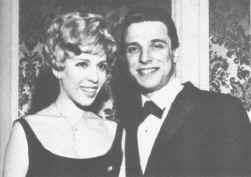

Another of the brilliant professional songwriting teams employed
at New York's Brill Building in the during '60, Barry Mann and Cynthia
Weil wrote dozens of hit songs for various acts. Besides Goffin/King, this was
Don Kirshner's most productive and gifted team.![]()
Barry Mann abandoned an architecture studios to become a songwriter in 1958. Achieving his first hit in collaboration with Michael Anthony in early 1958 with "She Say (Oom Dooby Dom)," he was hired as a staff songwriter at Aldon Records. Teaming with a number of other writers in the early '60s, Mann co-wrote "Footsteps by Steve Lawrence, "I Love How You Love Me" by The Paris Sisters," and Patches" by Dicky Lee. In 1961 he recorded a solo album that yielded the hit "Who Put the Bomp (In the Bomp, Bomp, Bomp)" co-written by Gerry Goffin.
While on staff at Aldon Mann met Cynthia Weil. In August 1961 they were married and writing songs together. It was a perfect marriage of talents, resulting in fifty hits in the next five years.
Their early hits included "Uptown" and "He's Sure the Boy I Love" by the Crystals in 1962. "My Dad" by Ray Peterson, "Blame It On the Bossa Nova" by Eydie Gorme, "only In America" by Jay and the Americans in 1963
Of all their contemporaries, they were the most versatile, able to adapt convincingly to country, soul, MOR, punk or anything else. Mann was able to write lyrics that were controversial or thought provoking, but still palatable to the commercial mainstream, such as "Uptown," "On Broadway," and "We Got To Get Out of This Place".
They were the only Brill team to write directly for Paul Revere and the Raiders, and their 1964 classic "You Lost That Lovin' Feeling" by the Righteous Brothers virtually redefined that scope and depth of pop songwriting. With Phil Spector they wrote some of the best Ronettes songs, like "You Baby" and "Walking In the Rain".
Other hits which they were associated through 1970 include Max Frost and The Troopers "The Shape of Things to Come," Cass Elliot's "It's Getting Better" and "Make Your Own Kind of Music," and B.J. Thomas' "I Just Can't Help Believing."
Mann had few roots in rock and roll. A fan of pop since the era of Frankie Laine and Jo Stafford, he later came to like vocal rhythm and blues, but didn't care much for Chuck Berry and Little Richard. Of the early rockers, only the Everly Brothers made an impression. Cynthia was into show tunes, but knew little contemporary music until exposed to it by Mann.
|
|
Unlike other writers, they wrote most of the time with no idea who the song would go to, and seldom got involved in the production. Though writing songs for other singers, Mann never gave up his ambition to sing, releasing songs under his name yearly. The couple left Aldon Music and moved to Los Angeles in the late 60s, kept writing hits, mostly for country artists and began writing for Broadway. In the mid-70s, Barry attempted a solo career and finally got to make albums via a deal with RCA.In 1975 he had a minor hit with "The Princess and the Punk." Later hits with which Mann is associated with include "Here You Come Again" by Dolly Parton and "Sometimes When We Touch" by Dan Hill, both from 1987. Barry Mann and James Horner composed the music for the 1986 animated film An American Tail. Barry Mann and Cynthia Weil are still happily married after 38 years.